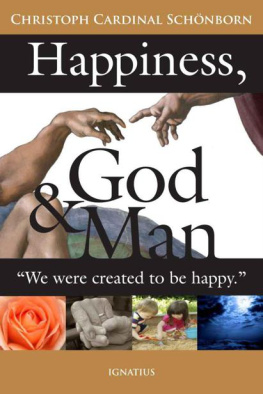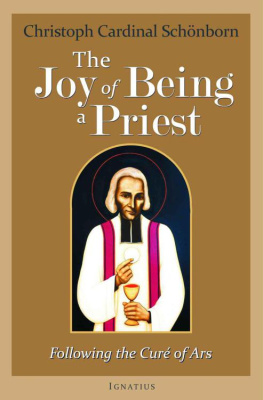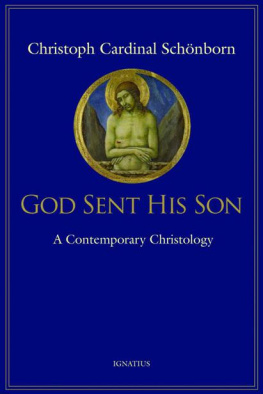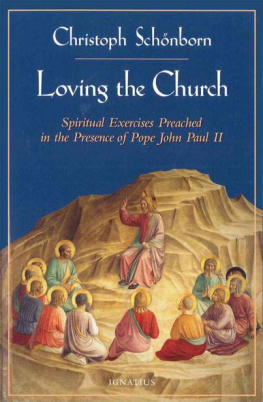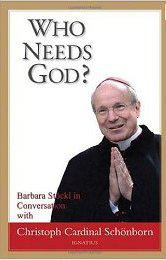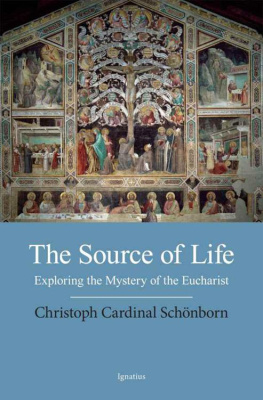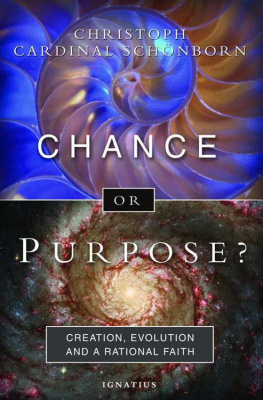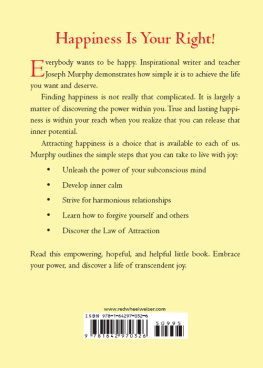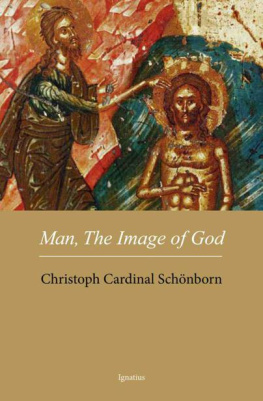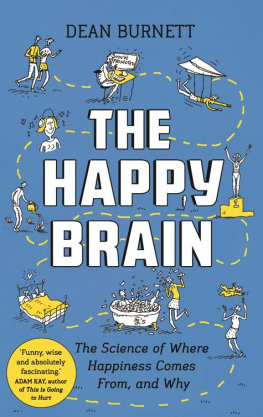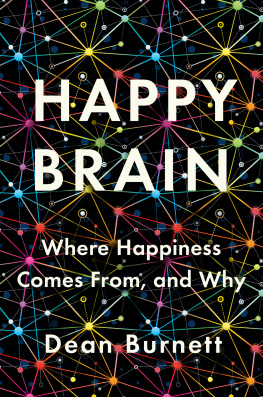Happiness, God, and Man
Christoph Cardinal Schnborn
Happiness, God,
and Man
Edited by Hubert Philipp Weber
Translated by Michael J. Miller
IGNATIUS PRESS SAN FRANCISCO
Original German edition:
Vom geglckten Leben
2008 by Amalthea Signum Verlag, Vienna
Main cover image:
Creation of Adam by Michelangelo (detail)
Sistine Chapel, Vatican
istockphoto/estelle75
Cover design by Roxanne Mei Lum
2010 by Ignatius Press, San Francisco
All rights reserved
ISBN 978-1-58617-361-6
Library of Congress Control Number 2010931416
Printed in the United States of America
Contents
We were created to be happy
A happy man
Happiness, small and great
Morality and happiness
The common good
Happiness and blessedness
Happiness and self-giving
Happiness and mercy
Is love friendship?
Establishing friendship
Friendship with God
Conclusions
The revelation of the name in the burning bush
The proof of forgiveness Three consequences
( Mt 5:4 )
When will they be comforted?
To what kind of mourning does the promise of comfort apply?
Reasons for hope
The Europe of the shrines
Churches, open your doors!
A unique presence: The Real Presence
Liturgical reform and the experience of God
Rediscovering the sense of God
Rediscovering the beauty of the liturgy
Election and universality
Responsibility for Austria and Europe
Living in the present
Bridge-building efforts
Where do I come from?
Where am I going?
What is the meaning of my life?
Living in the high-voltage area
The measure of reconciliation
The significance of remembering
Signs of hope in the fight against the darkness
Background
Heritage
Center
Misericordias Domini
The three novels in telegraphic style
The battle: An investigation of particular motifs
The evil power and the power of good
The life of Orual of Glome
The abyss of selfish love
The way to God
Grace and disgrace on the stage
Is clemency authoritarian caprice?
Angelo, or Let anyone who thinks that he stands take heed lest he fall (1 Cor 10:12)
Isabella, or pardon is the measure
Introduction
All men want to be happy. The longing for happiness does not have to be learned; it is innate. And it can hardly be unlearned. For we never simply acquiesce in unhappiness. Christian faith, the Christian way of life, and the imitation of Christ are understood to be signposts pointing the way to happiness. Therein lies their attractiveness; upon this depends their credibility.
Although the texts collected in this book were composed on very dissimilar occasions, they all revolve around the central theme of what makes life happy. They also document the personal search and longing for the happiness that God has promised and that so often is glimpsed only in its counterpartthe experience of suffering.
Part 1 is explicitly concerned with mans striving for happiness and his experiences of happiness, small and great. Thomas Aquinas sees friendship as the expression of the love that makes us happy. Friendship with God is possible, and it is the greatest happiness imaginable, although often it is still so distant.
Part 2 deals first with the revelation of Gods name in the Bible. His closeness and his mercy are the original promises of happiness. Next come two Lenten homilies that the late Cardinal Lustiger invited me to preach at Notre Dame Cathedral in Paris. The first one addresses the apparent contradiction in the fact that Jesus singles out unhappy people, the sorrowful, as being blessed. The second one asks how Europe can rediscover itself today, so that it does not remain without hope.
Part 3 contains homilies that were preached at liturgies for four Austrian celebrities. First comes a tribute to Otto von Habsburg, son of the last Austrian emperor, Blessed Karl of Austria. Three funeral homilies follow. I gave the first for my predecessors predecessor, Franz Cardinal Konig, at his Requiem Mass in 2004. Pope John Paul II had sent Joseph Cardinal Ratzingerwho today is our Holy Father, Pope Benedict XVIto attend the Mass as his personal representative. My homily at the funeral Mass for Austrian President Thomas Klestil elicited a major response for several reasons, probably because I so openly addressed his painful failure in marriage, his longing for a happy life, as well as his (and the Churchs) need to deal with it properly. Nor could the homily at the funeral Mass for former Austrian President Kurt Waldheim fail to mention the drama that he had to go through, despite all efforts to achieve reconciliation.
The great drama, the tragedy of the twentieth century is the subject of part 4 . Ideologies promised great happiness on earth. In order to bring it about, they maintained, one had to do away with whatever or whoever was hindering the arrival of that happiness. Two speeches, given in Mauthausen and in Yad Vashem in Jerusalem, testify to the devastating consequences of those ideologies.
Finally, part 5 is dedicated to literature. I admit that I am a fan of Gertrud von Le Fort and C. S. Lewis. Both authors, as I see their works, give witness to a happiness that overcomes all darkness through suffering, trials, and forgiveness. The happy ending is not a cheap one, but a sure one, because it has already been attained through the victory of love in Christ. This book concludes with an interpretation of William Shakespeares play Measure for Measure , which is set in Vienna; I had the honor of presenting this talk on the stage of the Vienna Burgtheater. I see it as a play that, in a manner unsurpassed in Shakespeares work, treats the theme of forgiveness, without which no one in our chaotic world can succeed at having a happy life.
No work ends happily through individual achievement alone. Not even the various texts that are collected in this book. I ought to thank many people by name for conversations and exchanges with them, for their suggestions and help. Let me name just a few: Prof. Heinz Nuaumer, Prof. Erich Leitenberger, Dr. Michael Fritthum, Dr. Elisabeth Maier, Prof. Michael Waldstein, and my faithful coworker Josef Graisy, M.A. Finally I thank Dr. Brigitte Sinhuber of the publishing house Almathea Verlag for the patience with which she waited for the manuscript and Dr. Hubert Philipp Weber, who once again looked after it so well and proofread it so precisely. Anything unsuccessful about the book is to be charged to my account. The rest is gratitude, especially to the Lord, the Giver of all gifts.
Vienna, March 13, 2008,
the fourth anniversary of the death of Franz Cardinal Knig
+ Christoph Cardinal Schnborn
I
HAPPINESS AND BEATITUDE
What Makes Life Happy
We were created to be happy
During my childhood and youth I heard many sermons, but I have no recollection whatsoever of their contents. I know they were often long, or at least they seemed long to me. I was not an attentive listener. Strangely enough, I remember one sentence, however, and only that one, but with complete clarity. It emerges clearly from the wide torrent of oblivion like a single star. It was a sermon of the pastor who was in charge of our parish during my adolescence. Beaming with love, kindness, humor, and intimate union with the Lord: although he died young and suddenly in 1966, that is how I and many others still remember him. At that time priests still preached from the pulpit, and I recall the feeling of benevolence that streamed down from that pulpit. What he was preaching about I have forgotten, just like the sermons of his predecessors, except for the one simple sentence: We were created to be happy.
Next page
